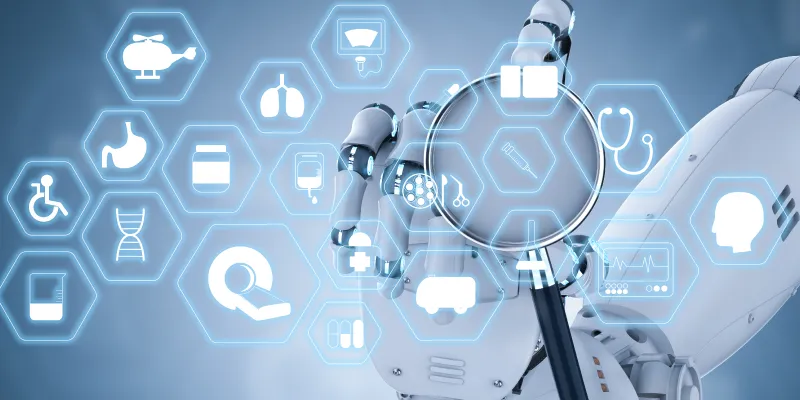Budget 2018: How will Artificial Intelligence fuel the Indian economy
Union Budget 2018 brought forth many announcements. But, an unexpected, albeit a significant one, was regarding the establishment of a national programme to direct efforts in the area of Artificial Intelligence (AI). Now, that’s a welcome initiative!

During his budget speech, Finance Minister Arun Jaitley said, "Technologies such as Machine Learning, Artificial Intelligence and others are the technologies of the future and NITI Aayog will establish a national programme to conduct research and development in these areas.”
Running high on the momentum of ‘Digital India’, the government also doubled allocation to this programme to $480 million in 2018-19, deciding to invest heavily in research, training and skill development in technologies such as AI, digital manufacturing, robotics, Quantum communication and Big Data intelligence, 3D printing, Blockchain, Machine Learning and Internet of Things.
Niti Aayog, the nation’s think-tank and premier policy-making body, has already been emphasising the role that new technologies will play in the development of the economy.
Earlier this month, highlighting its achievements since the three years of its formation, it mentioned that it has been working on initiatives to put Indian on the global map with regards to AI, and develop a robust ecosystem to promote it in health, education and agricultural sectors.
Niti Aayog is already in advanced stages of launching a National Data and Analytics Portal to facilitate training and dataset sharing between different organisations for AI-related applications.
These initiatives speak about the government’s focus on improving the ease of doing business, as well as making the lives of people simpler. The government seems to have reflected deeply on the findings of the Carnegie India report titled ‘India and the Artificial Intelligence Revolution’ which highlighted that:
- India needed to view AI as a critical aspect of its national security strategy.
- It must foster AI innovations and set up AI-friendly infrastructure to prepare India’s job and skill markets for AI-based future.
- With China, the US and South Korea making tremendous advances in AI, it was high time that India had a strong AI policy in place to benefit from AI revolution.
If we consider an Accenture report, AI holds the potential to add $957 billion to the Indian economy, thereby increasing its yearly growth rate of Gross Value Added (GVA) by 1.3 percentage points, and also boosting the nation’s income by 15 percent in 2035. However, AI development in India is still lagging behind many other G20 countries. This report also highlighted the need to have a national AI policy.
Perhaps, these are the reasons why AI received exclusive mention in Budget 2018. Let’s take a look at what positive outcomes the national programme on AI research and development could bring.
Startups

Currently, India is home to nearly 5,200 tech startups as per the last Nasscom Startup Report. These startups are changing the face of Indian industry, be it agriculture, e-commerce, financial services, education, automobiles, logistics, health or manufacturing. India is the world’s fastest-growing startup ecosystem and riding high on the wave of technology. The announcement in the Budget will go a long way in providing the necessary AI support required by startups to up their game.
Job creation

Unlike the common belief that AI will snatch jobs from humans, it will actually create new jobs. A Gartner study shows AI will create 2.3 million jobs while eliminating 1.8 million by 2020. All economies across the world, including India, need more AI professionals. Currently, more than 800 companies are working on, or are deploying AI, there are 29,000 AI professionals and there are around 4000 job openings in AI in India. Given that 70 percent of Indian companies will leverage AI by 2020, it is likely to create more demand for AI professionals. The AI is expected to change the job landscape in the next few years, so India needs to prepare its workforce with adequate skills. The national programme on AI can address this demand-supply gap effectively.
Make in India

The government’s flagship programme ‘Make in India’ has been receiving a fiscal push ever since it was launched. The production capabilities can strengthen with AI-assisted technology. A PwC report in association with ASSOCHAM India states,
AI augmented manufacturing operations can employ more reliable demand forecasting, a flexible and responsive supply chain, quicker changes in operations, and more accurate scheduling and inventory optimisation. Other benefits involve the creation of smarter, quicker and environmentally sound processes.
The enhanced R&D efforts could help develop innovative processes to change the face of the Indian manufacturing sector and train low-skilled labour for advanced and strategic tasks.
Quality of life

From healthcare to agriculture, AI is expected to improve the quality of life of people. Many companies have already launched a few such products. For instance, Tata Rallis uses AI-powered drones to administer pesticides by harnessing data on crop health and soil conditions to increase output.
A startup named NetraDyne is using AI to improve road and driver safety. Another startup called Zenatix provides IoT-based energy monitoring and control products for energy efficiency and savings. IBM Watson has partnered with the Indian government to develop AI models that could create smart cities. India’s Smart City Programme aims to create more than 100 smart cities by 2020 which calls for fast implementation and AI could support it aptly regarding technology.
AI heralds growth for the Indian economy. We need not fear it, rather embrace it in a way that it makes our way of living intelligent, helps us to focus on creativity and innovations, and propels our country towards a technology-driven path. The announcement on AI in Budget 2018 is just a step ahead in that direction.
(Disclaimer: The views and opinions expressed in this article are those of the author and do not necessarily reflect the views of YourStory.)







